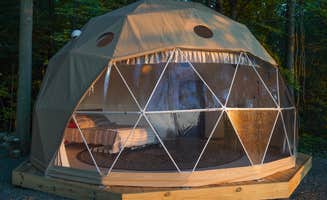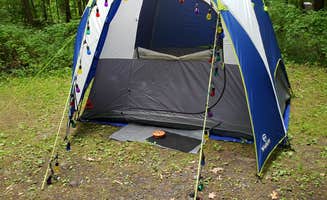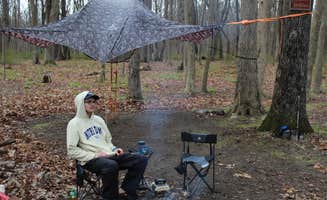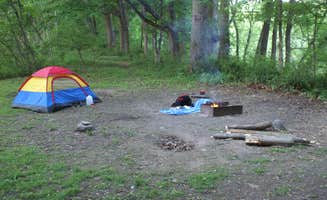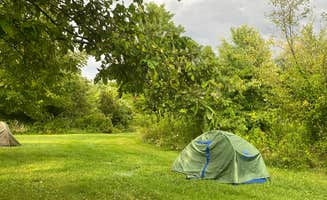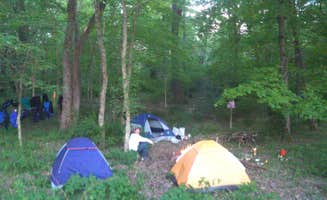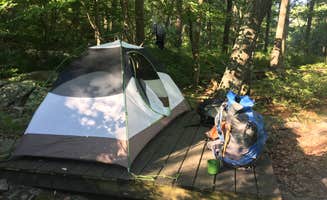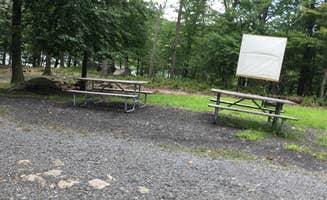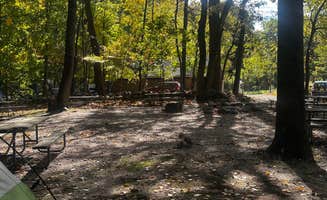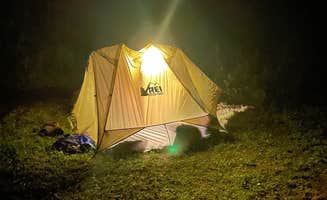The Delaware River region near Sussex offers tent campers a mix of rugged island locations and state park sites across elevations ranging from 350 to 1,800 feet. Primitive river sites require paddling equipment and navigation skills while walk-in sites at state parks provide moderate terrain with variable access to facilities. Summer temperatures average 75-85°F with nighttime lows of 55-65°F, creating comfortable camping conditions from May through September.
What to do
Waterfall hiking opportunities: Multiple cascades accessible within short hiking distances of campsites. At Namanock Island, "You have Raymondskill Falls about a half an hour above you on the river, and down river you will shortly come to Dingman's Crossing, (lots of history), and a short hike takes you to two more waterfalls," notes reviewer John B.
Paddle to remote sites: Access primitive boat-in sites via canoe or kayak for secluded camping experiences. At Sandyston Boat In Campsites, "We were the only one on our island, thankfully," reports Adeline M., highlighting the opportunity for complete privacy on river islands.
Historical exploration: Discover abandoned structures dating to the 1700s along the Delaware corridor. "Within minutes on the Pennsylvannia side of the river you can hike to Raymondskill Falls, (one of many in easy walking distance), as well as search for abandoned/forgotten homes and mills,(some of which date back to the 1700's), or try your luck at fossil and artifact hunting," explains John B. at Sandyston Canoe Camp.
What campers like
Night sky viewing: The river provides exceptional stargazing opportunities away from light pollution. "The absence of light sources beyond your camp remind you that you are truly alone in the wilderness," notes a camper from Hornbeck's River Campsites.
Spacious primitive sites: Many river locations offer ample room for larger groups without feeling crowded. At Jenny Jump State Forest, "The sites are hit or miss in terms of comfort, some have large, flat, clear spaces for multiple tents, some you have to wedge a tent to avoid rocks," reports Seth K., giving insight into site variability.
Wildlife sightings: Expect encounters with diverse animal species in the Delaware Water Gap region. "Lots of nature and animal sounds day and night, saw deer, doves, robins, woodpeckers, quail(?), chipmunks, squirrels, skunk(?), and heard frogs," notes Dwight D. at Steam Mill Campground.
What you should know
Water sources vary significantly: Many primitive sites require bringing all water, while established campgrounds offer spigots. "Site is a short walk to the water spigot that is always running and ice cold," mentions Dwight D. at Steam Mill Campground, but boat-in campers should plan accordingly.
Bear activity requires proper storage: Secure food properly in all tent campsites near Sussex. "There are bears in this area, and while I've not seen one in the campground, I have seen them on the trails while staying here. I store my food in my car overnight and toss garbage bags in the dumpster nightly as well," advises Kristan V. at Steam Mill.
Limited or no cell service: Communication options vary by location, often with minimal connectivity. "Absolutely zero phone service (for T-Mobile) which was AMAZING," reports Sara P. at Sebago Cabin Camp, demonstrating the complete disconnection possible.
Tips for camping with families
Cabin alternatives for mixed groups: Some locations offer structures for those not wanting tent accommodations. "It is great if you are going with a group/family and people want to sleep inside a cabin as oppose to a tent outside," explains Ethan K. about Sebago Cabins State Park options.
Kid-friendly ranger programs: Select parks provide organized activities for children. At Kittatinny Valley State Park, "They had activities for everyone and we had a blast at bingo and won!" shares Jackie G.
Bathroom accessibility considerations: Site selection impacts facility access for families with young children. "Shelter 2 is a minute walk from the restroom with sink/shower and water. Shelters 7 & 8 are even closer while 4 & 5 are the furthest, may an extra 5 minutes walk?" explains Dwight D. about Jenny Jump State Forest, providing practical layout information.
Tips from RVers
Size limitations: Most tent campsites near Sussex aren't suitable for larger recreational vehicles. "I would not drive an rv in here except maybe a small type trailer," advises Gregg T. at Elks Brox Memorial Park, giving practical insight into access limitations.
Limited hookup availability: Few locations provide RV-specific amenities, requiring self-containment. "Campsite is flat, grassy, some rocks to avoid," notes Dwight D. at Steam Mill Campground, describing terrain considerations important for smaller trailers.
Alternative car camping options: Consider car-accessible sites when RV sites aren't available. "We requested the same site - T220 - as it is closest to the water spring as well as not too far from the primitive toilets," explains Kristan V. about Steam Mill Campground, noting this site works for "small travel trailer" users.


